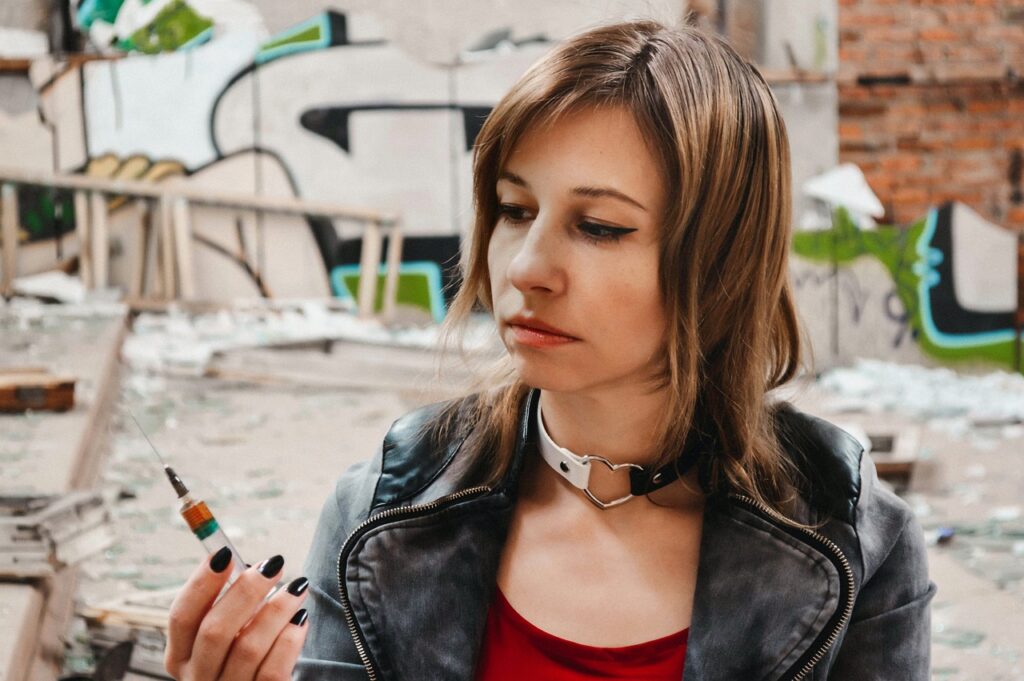“In order to be intimate with another, one must first be willing to be intimate with oneself, and any addiction, regardless of what it is, is an avoidance of intimacy with the self.” – Anne Wilson Schaef, Escape From Intimacy.
Strangely, romantic relationships can function as an addiction no less powerful than drugs or alcohol. Doubly strange is that many of the people who hold up intimate relationships as the ultimate value in life are relationship addicts, who are paddling feverishly in the other direction while proclaiming how important intimacy is. This is confusing for everyone involved (most of all the addicts).
Often, the people we most admire for their interpersonal skills – especially their skills with the opposite sex – are relationship addicts. That is why they have developed their skills to such a high degree. All addicts develop specific skills necessary to procure and protect their “supply.” Relationship addicts are no different.
It’s worth your while to learn a little about relationship addiction. I’ll explain why that is, offer some personal background, and then describe relationship addiction briefly.

Why You Should Know
Learning about relationship addiction can serve you in several ways:
- If you are trying to find or build a healthy relationship, it can help you avoid pitfalls and find your way to something better.
- If you are trying to live happily solo, it will help you to avoid relationships that will ultimately deplete you. It will also defuse a sense of “missing out” by unveiling the cultural mirage we construct around many romantic relationships.
- If you want to understand relationships better, learning about their addictive versions can help you see important parts of the process you may not have noticed.
- If you recognize yourself in the descriptions of relationship addiction, even to a modest degree, you can accelerate your personal development by addressing it.
My Background
My father and mother both died of alcoholism. About two months ago, so did my little brother. I have struggled with substance abuse myself, as have all my siblings. Back in my 20s, I did a lot of personal work around being raised in an alcoholic home and my own addictive propensities. Over several decades of my professional career as a psychologist, I saw many people who had a wide range of addictions. So I know a bit about the subject, personally and professionally.
A long time ago, when I was 29, I learned about relationship addiction. I recognized that I was in an addictive relationship at the time. I recognized that I fit – to some degree, anyhow – the profile of a relationship addict. I didn’t have it as bad as some, but I had it. I was a relationship addict. Not a sex addict, mind you, but a relationship addict – someone addicted to the “high” of being in love and/or being in a relationship. I was using women and relationships to try to “fix” weak parts of myself.
This was humbling and embarrassing to admit. I had been proud of the work I had done on myself earlier, and yet here I was, practicing an addiction for years, unaware. Furthermore, I thought I had been working at developing the skills required for healthy, intimate relationships (e.g., self-disclosure, empathy, etc.). But instead, I had been using those skills to get women to like me, and to hook them into a relationship to serve my needs.
I pulled the ripcord on the addictive relationship I was in. I changed course abruptly. I went “abstinent” for many years and worked on myself again. That was a long and bumpy process, which I won’t recount here.
That’s enough about me. I just wanted to give you a little background so you knew where I was coming from. Let me tell you about relationship addiction.
Relationship Addiction is Normalized
The first thing to know about relationship addiction is that it is so common as to almost be the norm. That is the main obstacle to recognizing it as an “addiction,” which is a pathological label signifying that something is wrong. When something is common and ordinary, it’s hard to see it as a problem. But of course, the fact that something is normal is no guarantee that it is healthy.
Our culture (I’m speaking from the US) holds up addictive relationships as normal, even good. The social programming comes from all quarters – family, church, peers, music, movies, TV, and from the culture at large. I won’t describe all the ways this happens, because you would fall asleep, but I’ll give you one example to stand for the rest.
I heard this a couple of weeks ago in the grocery store:
“I can’t live if living is without you/I can’t live, I can’t give anymore/I can’t live if living is without you.” – Harry Nielson, “Without You”
When most people hear that, they think, “Aww, how romantic. He’s so in love.” Here’s what I thought: “That sounds like an addict in withdrawal. Poor sap.”
But multiply that simple example by several thousand, and you’ll get a sense of how normal and even approved of relationship addiction is in our culture.

What is Relationship Addiction
We need to start with a definition of addiction. I’m going to simplify a bit, but an “addiction” is basically any repetitive behavior that fits the following parameters:
- It produces a “high” or euphoria
- It allows the person to escape internal problems, pain, or stress
- It has negative consequences
- The person returns to that behavior over and over, despite the negative consequences
Addiction means you get hooked on a behavior that makes you feel good temporarily, allows you to escape internal pain/stress temporarily, and has negative consequences over the long haul. Many behaviors can become addictions: gambling, sex, work, videogames, social media, shopping/spending. And romantic relationships.
I’ll go through the criteria and show how relationships can be addictive. To clarify, I’m not saying that all relationships are addictive. That’s clearly not the case. I’m saying relationships can and often do function as addictions. I am also not saying that it’s a matter of either/or, either a relationship is healthy or it’s addictive. All relationships are a mixture of healthy and unhealthy elements. It’s a matter of which trend predominates.
First criteria. Romantic relationships clearly make people feel good. They are a lot of work and trouble, and we wouldn’t bother with that if relationships didn’t provide powerful emotional rewards. People in romantic relationships experience elevated mood at the beginning of a relationship, then powerful euphoria during the limerence phase. These feelings run the ventral-tegmental pathway just like any other highly rewarding stimulus does.
Beyond just the honeymoon phase, the person also experiences enhanced self-esteem, increased perceived status, validation from the partner, and social validation from being in a relationship. All of that feels good, too – although the valence of those rewards depends on the person’s need for them (for self-esteem boosts or social validation, for instance).
This brings up an interesting sidenote. You don’t even need to be in a relationship to be a relationship addict. Some people get high just by fantasizing about the idea of being in a relationship. Romance novels are the best-selling genre of fiction, and there isn’t even a close second. Need I say more?
Second criteria. Sexual-romantic relationships involve a strong external focus on the other person or the state of the relationship. This external focus allows you to avoid painful or troubling aspects of your inner life. You don’t have room to think about your inner world when you are immersed in the world of the other person or you are preoccupied with the Relationship. It is a handy way to avoid dealing with yourself. It helps if you can add some excitement to the mix – emotional ups and downs or drama.
This avoidance mechanism is a common feature in addiction. Heck, it’s a common feature of most forms of psychopathology. The avoidance cycle is self-reinforcing: the more you avoid, the weaker you get internally, and this increases the motivation to avoid, and so on. The more you use the addictive object/process, the deeper the psychic hole you dig for yourself, and the harder it gets to extricate yourself.
Third criteria. I just mentioned one negative consequence of relationship addiction. I’ll give you a couple of others. People in addictive relationships relate mainly through their public/social selves or masks. In doing so, they neglect or abandon their inner/private selves for the sake of the connection. Although they obtain relational rewards, the internal price is high. It comes in the form of the loss of authentic self-respect/self-esteem, stymied internal growth, loss of interior strength, and generation of additional pain inside. And because they are avoiding internal realities they ought to be facing and dealing with, they weaken themselves and retard their personal development. There are plenty of other negative consequences associated with relationship addiction, but that is a sample.
Fourth criteria. People who have addictive relationships return to that behavior repeatedly. They either continually use the same relationship partner throughout life or else move from one partner to the next.
Relationships, then, can fit the addictive pattern. That is no surprise, given the evolutionary importance of romantic-sexual relationships to human survival and reproduction. Brain circuitry that undergirds romantic-sexual attraction and bonding flows into the same ventral-tegmental pathway as food, sex, and other behaviors associated with the evolutionary bottom line.
It’s not just the chemistry that makes an addiction, though. When it comes to addiction, it’s not about the substance or behavior so much as it is about the person’s relationship to that substance or behavior. It’s about what that substance or behavior does for that specific person, what psychological or emotional purpose it serves. Because of underlying deficits, some people are more predisposed to addiction than others. I’ll say more about that in the section on the relationship addict.

Types of Relationship Addiction
Relationship addiction comes in two main forms. The first type is an addiction to “being in love,” an addiction to the limerence phase. These people will typically jump from one short-term relationship to the next. They leave one relationship when the thrill wears off to search for the next. These people may be skilled in the arts of seduction and stoking romantic passion. This is a common form of relationship addiction. It is pretty easy to spot, both in yourself and others.
The second type is more common but harder to detect. It is harder to detect because it is so common. It is also harder to detect because relationship addicts tend to be good at both self-deception and impression management (i.e., shaping themselves to be what they think others want). They conceal reality from themselves and others.
This second, much more common type is addicted to being in a relationship. As I mentioned earlier, romantic relationships provide emotional rewards beyond just the limerence phase. They provide boosts to self-esteem, to perceived status. They provide validation from the partner and from society in general.
Some of these people have marriages that last an entire life. More often, though, they move from one marriage or long-term relationship to another. They may have been married three or four times or have had dozens of partners. Typically, they don’t spend much time outside of relationships – maybe a year, two at most. They feel liberated when a relationship ends, but that feeling is fleeting. It isn’t long before they begin to feel lonely, restless and bored, itching for the next relationship fix. They need a relationship to function well. Addiction is very much about dependency and need.
I don’t mean to imply, by the way, that interpersonal dependency is a bad thing. We all need each other to some degree. It’s the matter of degree that is important. There is some level of dependency and need built in to human nature, and as a consequence, there is some propensity to relationship addiction also built in to human nature as well. It is “a feature, not a bug,” as they say. So again, it’s a matter of degree.
Relationship addicts are often very talented, interpersonally. Some of them have very well-developed interpersonal skills. This can fool us into thinking they are good at relationships, whereas they are actually using those interpersonal skills (e.g., honest self-disclosure, empathy, careful listening) as a subtle con to hook others into relationship, to get their fix. I’m not suggesting this is a conscious manipulation on their part (although sometimes it is); most addicts do this unaware, without understanding their own motives. It can be hard to tell the difference sometimes.
The Relationship Addict

In the addiction field, it has long been known that the substance by itself does not cause the addiction. It can cause physiological dependence, but that is not the same. As I mentioned above, addiction isn’t so much about the substance or the behavior itself as about the person’s relationship to that substance or behavior, the function that substance or behavior serves for them, i.e., what it does for them.
Some people are more vulnerable to addiction than others. Some of this is genetic, although we do not understand how that works. We do know that some people are predisposed to addiction because of pre-existing psychological or emotional deficits that make the rewards of the substance/behavior extremely potent for them – much more potent than they would be for a healthier person.
As I mentioned earlier, relationships have a series of powerful rewards – the euphoria of being “in love,” sex, excitement, boosts to self-esteem, perceived status, belonging, and validation both the partner and society. A person prone to relationship addiction has deficit states that match those rewards. That makes those rewards feel much more potent for them – much more pleasurable or relieving – than they would be for someone who didn’t have those deficits.
For example, people prone to relationship addiction often have mood or anxiety issues – dysthymia, generalized anxiety, or social anxiety. They often have low self-esteem or insecurities related to whether they “stack up” interpersonally (e.g., are good or attractive enough). They may believe they are low status and be sensitive to that status. Or they may have strong needs for external validation or validation from the opposite sex.
When people with these pre-existing vulnerabilities enter a relationship, they obtain powerful boosts in all those areas. Those boosts feel great to them, much better than they would a person without those deficits. It is similar to how highly anxious people are more prone to alcohol abuse, because they experience the anxiety-reducing effects of alcohol as much more pleasurable than a non-anxious person does. In the same way, people with pre-existing deficits in self-esteem, perceived status, internal security, etc. is experiences the rewards of romantic relationship much more powerfully than a healthier person does, and so he/she is much more prone to becoming addicted to relationships.
In relationship addiction, two people with pre-existing deficits come together and use each other in an attempt to “fix” those deficits – or at least to try. Each person’s psychological functioning becomes heavily dependent on the other person or the relationship to maintain equilibrium. By “psychological functioning,” I mean the ability to feel reasonably good on most days, maintain your self-esteem, manage your emotions, etc. Each person is trying to patch the holes in their psychological functioning by using the other person or the Relationship to do it. They are essentially using the other person as an “addictive object,” not unlike how a drug addict uses a drug. Because of his/her pre-existing deficits, the relationship addict becomes “hooked” on the psychological, emotional rewards that the relationship offers.
There is more to it than that. Modeling also plays a role. Many of us grew up in families where codependence was the norm, and all of us see addictive relationships all over the place. So it becomes second-nature to relate this way. But that is enough for now.
Wrap-Up
I’d encourage you to learn about relationship addiction. If you do, you can spot the early signs in yourself and others, become more aware of it in the culture. Most people never learn about it, and so they just live it out, unaware. That’s how a lot of people like it. If you can learn to see it, though, you can step back, unhook, and find better ways to relate to others and yourself. Learning about it also helps you to identify underlying deficits that make you vulnerable to relationship addiction in the first place.
I only skimmed the surface here. I didn’t mention many of the symptoms or signs of relationship addiction. I didn’t discuss other addictions that are related into relationship addiction, like addiction to drama, excitement, sex, or validation/attention. It’s a big subject. If you’d like to explore it further, you could check out Anne Wilson Schaef’s Escape From Intimacy, Susan Peabody’s Addicted to Love, or Stanton Peele’s Love and Addiction. Each of those books has substantial flaws, but then, so do I. Despite their limitations, they provide some valuable insights. You could also check out the literature on codependence, because there is substantial overlap between the concepts of codependence and relationship addiction.
Great piece. Not only insightful, but also well structured and absorbing.
Thanks, B4B, glad you found it interesting.
Very insightful! Thanks for this, and for all your other writing. I’ve been reading your stuff for a couple years and I find it very helpful. I chuckled at your statement “Beyond just the honeymoon phase, the person also experiences enhanced self-esteem, increased perceived status, validation from the partner, and social validation from being in a relationship.” Maybe because I’m older, this seems so odd to me, it’s actually funny. But when I was young, I was surely guilty of that. But I still occasionally see older people who feel “less than” due to being single. It’s bewildering to me. I’d say a healthy person is more likely to be single than coupled. Generally speaking.
Thanks, Jan, I’m glad to hear it.
If I had room, I would’ve gone on a tangent to clarify that the self-esteem there is a socially derived, reflected appraisal, which is different than what I consider “real,” authentic, internally grounded self-esteem. I could’ve said similar things about those other “boosts” – boosts in status, for instance, are all about how other people perceive you, which again is externally grounded, not internal. Same for the external validation from the partner and society. Those are weak versions of the real thing.
I didn’t have space to go into all that, though, because the article was getting too long already. But thanks, you’ve given me the opportunity to add it here.
I don’t know whether healthy people are more likely to be single. The married folks would claim the opposite, although that data is heavily qualified (e.g., “long-term happily married people,” which is only a small subset) and always has a ton of uncontrolled confounds. I have known some very healthy single people (“health” in the mental sense), but I’ve known plenty of very unhealthy ones, too. Same with married people.
The trouble with comparing huge groups (married vs. single) is that huge groups have tremendous individual variability, which is never captured by group comparisons, which use group averages. We are individuals, not group averages. The results of any large-group comparison don’t tell you anything about YOU, as an individual. I just work to make my own life as good and enjoyable as I can, and I let the statisticians worry about the rest.